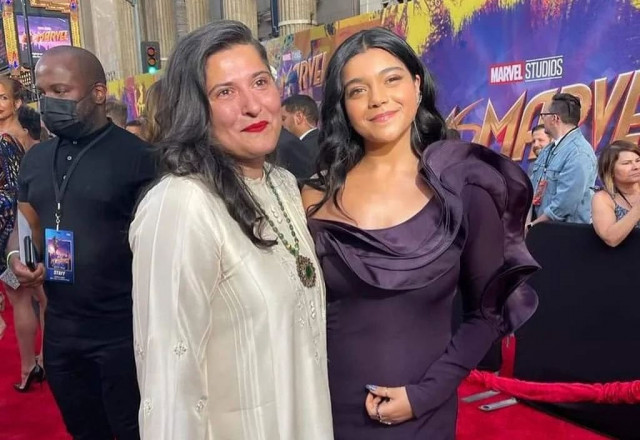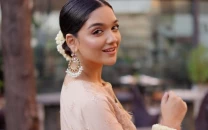I love a challenge: Sharmeen Obaid-Chinoy talks depicting partition in 'Ms. Marvel'
The Oscar-winning Pakistani filmmaker has directed episodes four and five of the series

Pakistan's first-ever Oscar-winning filmmaker, Sharmeen Obaid Chinoy, has recently added yet another feather to her hat as she has now become the first local director to have directly worked with Marvel. Chinoy was one of four filmmakers roped in to helm the latest Marvel offering, the story of Pakistani-American superhero, Kamala Khan.
Ms. Marvel has been all the rage since the news of the comic book turning into a full-fledge show broke out. The show has been lauded by fans and critics to stay true to its roots, making sure to cast appropriate actors and portray the true desi culture.
Chinoy has directed episodes four and five of the series. However, one scene in the latest episode has the internet talking! In the fourth episode of Ms. Marvel, we see Kamala visiting Karachi for the first time to see her Nani, Sana, played by Pakistani star Samina Ahmed. In the said episode, we see Ms. Marvel teleporting to 1947 and the audience gets to see a glimpse of the Indo-Pak partition.
For Chinoy, the partition is a subject near and dear to her. "I've been creating films and telling stories from around the world about women who have extraordinary abilities like working in healthcare and education and climate change in their communities," she told POPSUGAR about her latest venture. "And I just think of them as superheroes without capes."
She went on to talk about Kamala's relationship with Sana in episode four as Sana narrates her experience of the partition. "The relationship between Kamala and her grandmother is so special. I've grown up with that exact same storytelling with my own grandmother," the filmmaker added how she drew narrative from her own personal experience with her grandmother. "Partition and the 1947 story is so ingrained in all of our lives. It's this big historical moment that we read about in our textbooks, but we've never seen it picturised in the manner that we are doing it in Ms. Marvel."
She further explained, "Their identities are fractured because a part of them grew up in another country that they no longer have a connection to. And Kamala's generation does not have that same connection because they don't see that world."
Chinoy went on to share her experience of working with Marvel as well. "They [Marvel] have trusted the entire team." She added, "Because Marvel brought so many authentic storytellers through the mix, not just in front of the camera, but also behind the camera and everyone who worked on location, through design, through costumes, [they] drew from their experiences that were very diverse. It really shows because this story is being told in the most authentic way that it could have been told."
She then commented, "They were very supportive of telling the story in the manner that it deserves to be told." Chinoy also knew exactly how she wanted the scene to play out, and it's what ended up on the screen. "She is walking on the platform. And there are these snatches of conversation that are taking her right back into that time period so that [viewers] can feel the anguish that people were feeling, the uncertainty they were feeling, and what the mood was," she remarked.
"I wanted to take audiences into that as if they could understand what the father and son, the mother and the daughter, the two friends hugging [are going through]. And I wanted to shoot it in a way where Kamala is walking and watching and the camera is going around and going around all of these conversations that then ends with her wanting to actually see what else is going on."
The Emmy-winning director relayed, "I love to throw myself in there. I love the challenge. I love the fact that we were going to a brand-new country and that I had to rebuild the world. It did kick my ass, I have to say. I was working all the time. I loved it though."
The Saving Face filmmaker then shared Kamala and Sana's equation in the show. "I wanted it to be that Kamala's grandmother is quirky and she's eccentric, and Kamala's inherited part of that quirkiness and eccentricity. Her mother, on the other hand, seems to have skipped the generation."
She went on, "Kamala can just be a normal teenager." Talking about Kamala's storyline with Bruno and Kamran, Chinoy quipped, "And so they go to the beach together and they have this funny sort of banter that's going back and forth. She found an ally for the first time who really understood her, which is very different from what her relationship had been with Bruno or Kamran."
In an earlier interview with The Express Tribune, Chinoy spoke about how she was roped in for the series. “I have been looking for the kind of story-telling that stays true to the kind of filmmaking my career has been based on." “My idea is championing the stories of ordinary men and women, who have extraordinary abilities,” she had commented.
“When the idea of bringing Ms. Marvel from comics to the screen came about, I was asked whether I want to throw my hat in the ring. I then thought to myself that this is the kind of story that excites me, that I’d like to be a part of, because it really is the birthing of a very different kind of superhero which will allow so many people around the world who are minorities, who are immigrants, see the reflection of themselves on screen," Chinoy had shared with the publication. "I went through the process of meeting the creators and executive producers at Marvel studios such as Kevin Feige, Victoria and Lou along with head-writer Bisha K Ahmed. I talked about my vision and why I want to be a part of this and before I knew it, I was calling 'action'.”
Have something to add to the story? Share it in the comments below.



















COMMENTS
Comments are moderated and generally will be posted if they are on-topic and not abusive.
For more information, please see our Comments FAQ